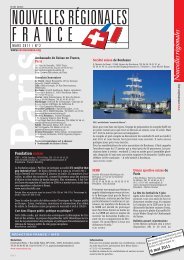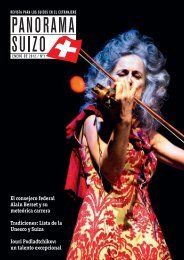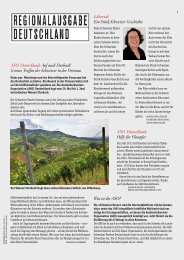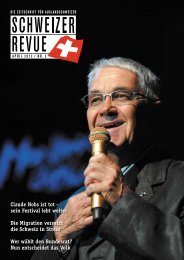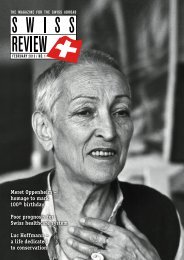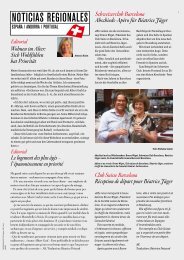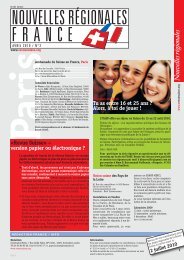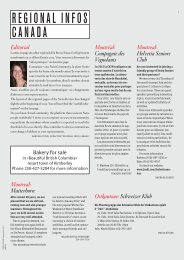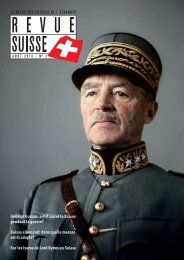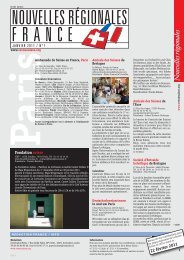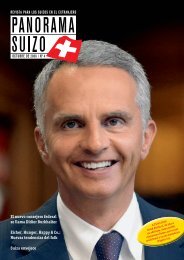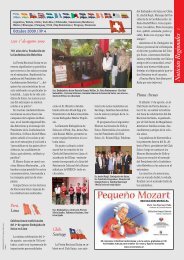Which energy will be best for Switzerland? Doris ... - Schweizer Revue
Which energy will be best for Switzerland? Doris ... - Schweizer Revue
Which energy will be best for Switzerland? Doris ... - Schweizer Revue
You also want an ePaper? Increase the reach of your titles
YUMPU automatically turns print PDFs into web optimized ePapers that Google loves.
EDITORIAL<br />
CONTENTS<br />
3<br />
Raptures in red and white<br />
AWhen the Swiss national football squad returned home after losing their World<br />
Cup game against Ukraine, the players were welcomed at Zurich airport as if they<br />
had won the competition. Even the missed penalties couldn’t dampen the fervour<br />
that awaited the team on their arrival back in <strong>Switzerland</strong>. During the competition tens<br />
of thousands of red-and-white-clad Swiss fans travelled to Germany, determined to turn<br />
their side’s encounters into home games. Thousands watched the games on huge screens<br />
in cities up and down the country, revelling in their team’s per<strong>for</strong>mance at the group stage<br />
of the competition. Swiss flags and red t-shirts <strong>be</strong>aring the Swiss cross were everywhere.<br />
The country was in party mood, the likes of which it had seldom seen. And even the side’s<br />
un<strong>for</strong>tunate elimination in the second round didn’t dampen spirits <strong>for</strong> too long. After all,<br />
the FIFA World Cup in Germany was just the <strong>be</strong>ginning: “That was the World Cup. Now<br />
<strong>for</strong> the European Championships. Roll on 2008”, wrote main sponsor Credit Suisse in<br />
full-page ads, voicing the sentiments of Swiss football fans. In two years’ time, the Swiss<br />
national squad could <strong>be</strong> playing <strong>for</strong> the European title in front of its home crowd. Then<br />
the party <strong>will</strong> <strong>be</strong>gin anew.<br />
Rarely has <strong>Switzerland</strong> witnessed the type of enthusiasm <strong>for</strong> sportsmen shown to<br />
the current national football squad and their coach, Jakob “Köbi” Kuhn. And never <strong>be</strong><strong>for</strong>e<br />
has <strong>Switzerland</strong> had a national squad that prompted so much support while embodying<br />
a modern, open-minded country. Players like Senderos, Dzemaili, Djourou, Barnetta<br />
and Cabanas are the multilingual sons and grandsons of immigrant families. Their<br />
roots lie abroad, they play in Europe’s top leagues, and they are optimistic, ambitious and<br />
proud to <strong>be</strong> Swiss. They may <strong>be</strong> reserved when facing the media, but they clearly affirm<br />
their commitment to their country’s greatest possible success. They are self-confident<br />
and sure of their Swiss identity: an attitude by no means taken <strong>for</strong> granted.<br />
As recently as the 1990s, <strong>Switzerland</strong> drew attention to itself with the slogan “La<br />
Suisse n’existe pas” (<strong>Switzerland</strong> doesn’t exist). The ‘68 generation, left-wingers and the<br />
media in particular had major issues about <strong>be</strong>ing Swiss, and any<br />
<strong>for</strong>m of patriotism was equated with right-wing extremism. Flags<br />
were the scorned synonym <strong>for</strong> the army and the right-wing bourgeoisie.<br />
The end of the Cold War brought more relaxed attitudes.<br />
Indeed, “Swissness” has even made a distinct comeback since<br />
the Expo.02. Accessories <strong>be</strong>aring the Swiss cross are now extremely<br />
trendy and big money-spinners.<br />
The young people of today have a relaxed relationship with<br />
Heinz Eckert<br />
their home country and are proud of their red passport. They are<br />
not alone: A representative survey found that 78 percent of respondents were proud to<br />
<strong>be</strong> Swiss – up from 74 percent in 2004. In the past, national identity was never even questioned.<br />
Sociologist Kurt Imhof sees this as a positive development. “Democracy needs a <strong>be</strong>lief<br />
in communality, and it’s good that identifying with one’s home country is no longer<br />
the sole preserve of the Swiss People’s Party,” he says.<br />
“It’s cool <strong>be</strong>ing Swiss,” a 28-year-old designer confessed in an interview.<br />
Such sentiments are new to <strong>Switzerland</strong>. “Chauvinism is a matter of dosage,” said<br />
literary critic Peter von Matt in an interview on the issue. “Controlled delivery is good<br />
<strong>for</strong> you. It increases your joie-de-vivre and makes you adventurous. Ill-tempered self-flagellation<br />
is unproductive in the long run.”<br />
HEINZ ECKERT, CHEFREDAKTOR<br />
5<br />
Mailbag<br />
5<br />
Sounds: Jazz made in <strong>Switzerland</strong><br />
7<br />
Images: Lake Lucerne<br />
8<br />
<strong>Which</strong> <strong>energy</strong> is <strong>be</strong>st <strong>for</strong> <strong>Switzerland</strong>?<br />
We ask the experts<br />
13<br />
Portrait: New face on the Federal Council<br />
14<br />
Official DFA in<strong>for</strong>mation<br />
16<br />
Swiss Himalayan pioneers<br />
18<br />
Avenches - Rock in the arena<br />
19<br />
Politics: The new asylum law<br />
20<br />
OSA news<br />
22<br />
New services from Soliswiss<br />
23<br />
News in brief<br />
Cover Photo:<br />
<strong>Doris</strong> Leuthard, Federal Councillor. Keystone<br />
SWISS REVIEW August 2006 / No. 4<br />
IMPRESSUM: “Swiss Review”, the magazine <strong>for</strong> the Swiss Abroad, is in its 33rd year of publication and is published in German, French, Italian, English and Spanish in 21 regional editions.<br />
It has a total circulation of over 380 000. Regional news appears four times a year.<br />
■ EDITORSHIP: Heinz Eckert (EC), Editor-in-Chief; Rolf Ribi (RR), Alain Wey (AW), Gabriela Brod<strong>be</strong>ck (BDK), responsible <strong>for</strong> DFA In<strong>for</strong>mation Pages, Service <strong>for</strong> the Swiss Abroad DFA,<br />
CH-3003 Berne. René Lenzin (RL), reporting from parliament. Translation: CLS Communication AG ■ POSTAL ADDRESS: Publisher, Editorial Office, Advertising: Organisation of the Swiss<br />
Abroad, Alpenstrasse 26, CH-3006 Berne, Tel. +4131356 6110, Fax +4131356 61 01, Postal Account (Swiss National Giro) 30-6768-9. Internet: www.revue.ch ■ E-MAIL: revue@aso.ch<br />
■ PRINT: Zollikofer AG, CH-9001 St.Gallen. ■ CHANGE OF ADDRESS: Please advise your local Embassy or Consulate – do not write to Berne.<br />
Single copy CHF 5.– ■



